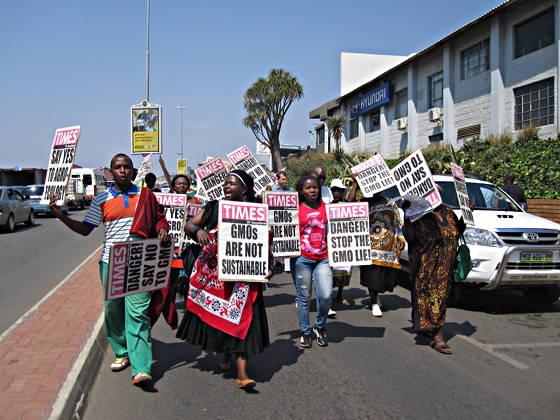Latest Resources

2 September 2020
Push back against risky and unsafe RNAi GM cassava cultivation in Kenya
An unproven genetically modified (GM) RNAi cassava variety is yet another staple food crop, after maize and banana, on the biotech industry’s agenda for commercial cultivation in Kenya. The brazen lack of safety tests contained in the Kenya Agricultural and Livestock Research Organisation’s (KARLO’s) application for cultivation, and disregard for adherence to biosafety best practise […]

28 March 2019
Cyclone Idai’s warning – Shift to agroecological systems that work with nature or suffer more dev...
Ranked as one of the worst tropical storms on record to hit Africa, Cyclone Idai made landfall in Beira on Thursday 15 March, before lacerating its way across central Mozambique and then on towards neighbouring Malawi and Zimbabwe. Heavy rains, flooding and storm damage has resulted in devastation on a vast scale. It is estimated […]

4 March 2019
Failure of Monsanto’s drought tolerant maize pushed on Africa – confirmed in US
The ACB shares with you a blog written by ACB’s Sabrina Masinjila and Anne Maina from Biodiversity and Biosafety Association (BIBA), Kenya A recent United States Department of Agriculture (USDA) report confirms what independent biosafety scientists, and African civil society, have been stating all along: Monsanto’s drought tolerant (DT) maize (MON87460) does not work! The […]

16 January 2019
Africa Group captured by colonial medicine, agribusiness and US military interests on gene drives...
On the pretext of supporting scientific innovation for malaria eradication, African countries vociferously defended a techno-fix that does not address the wider determinants of malaria – but rather, represents the changing face of colonial medicine and threatens the biodiversity of an entire continent. At the UN’s recent Convention on Biological Diversity (CBD), a proposal to […]

1 November 2018
Demystifying GM maize through collective action on World Food Day
In an effort to highlight the complex and concentrated South African agricultural and food system, with its unsustainable and deepening inequality, the African Centre for Biodiversity (ACB) and partner organisations initiated a “no GMO-maize campaign” earlier in 2018. This was followed up in August 2018, with a meeting of organisations that included Zingisa, Ntinga Ntaba […]

14 June 2018
Restrict, regulate and reduce corporate power in South Africa’s food system
I attended a dialogue on corporate ownership in South Africa in May, in Tshwane, hosted by Trade and Industrial Policy Strategies (TIPS). There was strong government representation at the dialogue, including from Treasury; Trade and Industry; Minerals and Energy; and Planning, Monitoring and Evaluation. Someone from the EU was also there. Corporate concentration is a […]

6 June 2018
Bayer opposes black economic empowerment in purchase of Monsanto
The Competition Tribunal announced the finalisation of the merger between Bayer and Monsanto in South Africa in May. Bayer had taken the original conditions imposed by the Competition Commission in 2017 to the Tribunal for reassessment. These included selling businesses to black economic empowerment (BEE) compliant companies. Bayer has claimed confidentiality on the conditions, making […]

4 June 2018
The debate on GMOs in Africa rages on, this time in Tanzania
A heated public debate on genetically modified organisms (GMOs) ensued during a seminar organised by MVIWATA – a network of smallholder farmers – in Morogoro, Tanzania. The meeting took place on 12 May 2018 and was attended by more than a hundred people, including parliamentarians and high-level government officials. The event, which was intended only […]

28 May 2018
Biosafety Indaba eSwatini: Unclear motives following approval to cultivate Bt cotton, despite dis...
The news that the Swaziland Environmental Authority (SEA) had authorised the importation and commercial release of Bt cotton seeds came as a huge shock to the African Centre for Biodiversity (ACB). It meant that ACB had to reconsider its earlier acceptance of an invitation by SEA to attend a National Biosafety Indaba on 22 May […]

18 October 2017
The GMO crisis in Swaziland
Swaziland is under enormous pressure to introduce genetically modified organisms (GMOs) into the country’s farming system. This pressure is coming not only from Monsanto but also from farmers and some sections of the public who have been fed a great deal of misinformation and hype by the pro-biotech machinery. The farmers, acting on incomplete and […]
